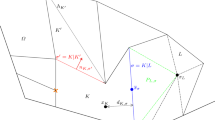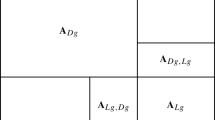Abstract
We propose a general hybrid-variable (HV) framework to solve linear advection equations by utilizing both cell-average approximations and nodal approximations. The construction is carried out for 1D problems, where the spatial discretization for cell averages is obtained from the integral form of the governing equation whereas that for nodal values is constructed using hybrid-variable discrete differential operators (HV-DDO); explicit Runge-Kutta methods are employed for marching the solutions in time. We demonstrate the connection between the HV-DDO and Hermite interpolation polynomials, and show that it can be constructed to arbitrary order of accuracy. In particular, we derive explicit formula for the coefficients to achieve the optimal order of accuracy given any compact stencil of the HV-DDO. The superconvergence of the proposed HV methods is then proved: these methods have one-order higher spatial accuracy than the designed order of the HV-DDO; in contrast, for conventional methods that only utilize one type of variables, the two orders are the same. Hence, the proposed method can potentially achieve higher-order accuracy given the same computational cost, comparing to existing finite difference methods. We then prove the linear stability of sample HV methods with up to fifth-order accuracy in the case of Cauchy problems. Next, we demonstrate how the HV methods can be extended to 2D problems as well as nonlinear conservation laws with smooth solutions. The performance of the sample HV methods are assessed by extensive 1D and 2D benchmark tests of linear advection equations, the nonlinear Euler equations, and the nonlinear Buckely-Leverett equation.
Similar content being viewed by others
References
Barth, T.J.: Recent developments in high order k-exact reconstruction on unstructured meshes. In: 31st AIAA Aerospace Sciences Meeting & Exhibit. Reno, Nevada (1993)
Berndt, M., Lipnikov, K., Shashkov, M., Wheeler, M.F., Yotov, I.: Superconvergence of the velocity in mimetic finite difference methods on quadrilaterals. SIAM J. Numer. Anal. 43(4), 1728–1749 (2005)
Brezzi, F., Lipnikov, K., Shashkov, M.: Convergence of the mimetic finite difference method for diffusion problems on polyhedral meshes. SIAM J. Numer. Anal. 43(5), 1872–1896 (2005)
Carpenter, M.H., Gottlieb, D., Abarbanel, S.: Time-stable boundary conditions for finite-difference schemes solving hyperbolic systems- methodology and application to high-order compact schemes. J. Comput. Phys. 111(2), 220–236 (1994)
Després, B.: Uniform asymptotic stability of Strang’s explicit compact schemes for linear advection. SIAM J. Numer. Anal. 47(5), 3956–3976 (2009)
Droniou, J.: Finite volume schemes for diffusion equations: introduction to and review of modern methods. Math. Mod. Meth. Appl. Sci. 24(8), 1575–1619 (2014)
Droniou, J., Eymard, R., Gallouët, T., Herbin, R.: A unified approach to mimetic finite difference, hybrid finite volume and mixed finite volume methods. Math. Mod. Meth. Appl. Sci. 20(2), 265–295 (2010)
Dumbser, M., Balsara, D.S., Toro, E.F., Munz, C.D.: A unified framework for the construction of one-step finite volume and discontinuous Galerkin schemes on unstructured meshes. J. Comput. Phys. 227(18), 8209–8253 (2008)
Goodrich, J., Hagstrom, T., Lorenz, J.: Hermite methods for hyperbolic initial-boundary value problems. Math. Comput. 75(254), 595–630 (2006)
Gottlieb, S., Shu, C.W.: Total variational diminishing Runge-Kutta schemes. Math. Comput. 67(221), 73–85 (1998)
Gustafsson, B.: High Order Difference Methods for Time Dependent PDE, Springer Series in Computational Mathematics, vol. 38, 1st edn. Springer (2008)
Hairer, E., Nørsett, S.P., Wanner, G.: Solving Ordinary Differential Equations I: Nonstiff Problems, Springer Series in Computational Mathematics, vol. 8, 2 edn. Springer (1993)
Harten, A.: High resolution schemes for hyperbolic conservation laws. J. Comput. Phys. 49, 217–237 (1983)
Huynh, H.T.: A Piecewise-Parabolic Dual-Mesh Method for the Euler Equations. In: 12Th AIAA Computational Fluid Dynamics Conference. San Diego, California (1995)
Imai, Y., Aoki, T., Takizawa, K.: Conservative form of interpolated differential operator scheme for compressible and incompressible fluid dynamics. J. Comput. Phys. 227(4), 2263–2285 (2008)
Isaacson, E., Keller, H.B.: Analysis of Numerical Methods, reprint edn Dover Publication (1994)
Iserles, A.: Order stars and a saturation theorem for first-order hyperbolics. IMA J. Numer. Anal. 2(1), 49–61 (1982)
Iserles, A.: Generalized leapfrog methods. IMA J. Numer. Anal. 6(4), 381–392 (1986)
Iserles, A., Strang, G.: The optimal accuracy of difference schemes. T. Am. Math. Soc. 277(2), 779–803 (1983)
Jiang, G.S., Shu, C.W.: Efficient implementation of weighted ENO schemes. J. Comput. Phys. 126(1), 202–228 (1996)
Karabasov, S.A., Goloviznin, V.M.: Compact accurately boundary-adjusting high-resolution technique for fluid dynamics. J. Comput. Phys. 228(19), 7426–7451 (2009)
van Leer, B.: Towards the ultimate conservative difference scheme IV. A new approach to numerical convection. J. Comput. Phys. 23(3), 276–299 (1977)
van Leer, B.: Towards the ultimate conservative difference scheme V. A second-order sequel to godunov’s method. J. Comput. Phys. 32(1), 101–136 (1979)
LeVeque, R.: Finite Volume Methods for Hyperbolic Problems. Cambridge texts in applied mathematics. Cambridge University Press, Cambridge (2002)
LeVeque, R.J.: Numerical Methods for Conservation Laws, 2nd edn. Lectures in mathematics. Birkhäuser (2005)
Liu, X.D., Osher, S., Chan, T.: Weighted essentially non-oscillatory schemes. J. Comput. Phys. 115(1), 200–212 (1994)
Luther, H.A.: Further explicit fifth-order runge-kutta formulas. SIAM Rev. 8 (3), 374–380 (1966)
Roe, P.L.: Approximate Riemann solvers, parameter vectors, and difference schemes. J. Comput. Phys. 43(2), 357–372 (1981)
Rusanov, V.V.: The calculation of interaction of non-steady shock waves with obstacles. USSR Comput. Math. Math. Phys. 1(2), 304–320 (1962)
Sanders, R., Weiser, A.: High resolution staggered mesh approach for nonlinear hyperbolic systems of conservation laws. J. Comput. Phys. 101(2), 314–329 (1992)
Shu, C.W.: High-order finite difference and finite volume WENO schemes and discontinuous Galerkin methods for CFD. Int. J. Comput. Fluid D. 17(2), 107–118 (2003)
Sod, G.A.: A survey of several finite difference methods for systems of nonlinear hyperbolic conservation laws. J. Comput. Phys. 27(1), 1–31 (1978). Review
Strang, G.: Trigonometric polynomials and difference methods of maximum accuracy. J. Math. and Phys. 41(1–4), 147–154 (1962)
Szegö, G.: Orthogonal Polynomials Colloquium Publications, vol. XXIII, 4th edn. Providence, RI (1975)
Toro, E.F.: Riemann Solvers and Numerical Methods for Fluid Dynamics: a Practical Introduction, 3rd. Springer, Berlin (2009)
Xiao, F., Ikebata, A., Hasegawa, T.: Numerical simulations of free-interface fluids by a multi-integrated moment method. Comput. Struct. 83(6–7), 409–423 (2005)
Zhang, Z.C., Yu, S.T.J., Chang, S.C.: A space-time conservation element and solution element method for solving the two- and three-dimensional unsteady euler equations using quadrilateral and hexahedral meshes. J. Comput. Phys. 175(1), 168–199 (2002)
Acknowledgements
The author thanks the University of Texas at El Paso for the general support in the form of research start-up fund. The author would like to thank Prof. George Papanicolaou for the fruitful discussion at the beginning stage of this project at Stanford University.
Author information
Authors and Affiliations
Corresponding author
Additional information
Communicated by: Jean-Frédéric Gerbeau
Rights and permissions
About this article
Cite this article
Zeng, X. Linear hybrid-variable methods for advection equations. Adv Comput Math 45, 929–980 (2019). https://doi.org/10.1007/s10444-018-9647-z
Received:
Accepted:
Published:
Issue Date:
DOI: https://doi.org/10.1007/s10444-018-9647-z
Keywords
- Linear advection equations
- Hybrid-variable interpolation
- Hermite interpolation polynomials
- High-order accuracy
- Superconvergence
- Linear stability




